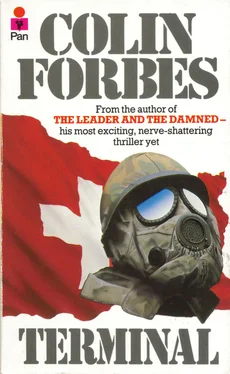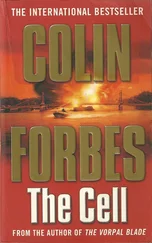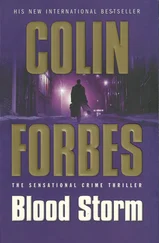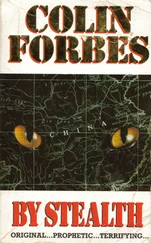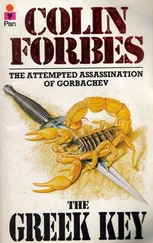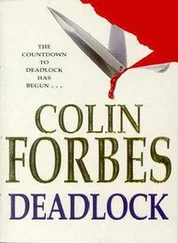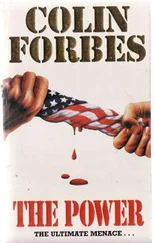Colin Forbes - Terminal
Здесь есть возможность читать онлайн «Colin Forbes - Terminal» весь текст электронной книги совершенно бесплатно (целиком полную версию без сокращений). В некоторых случаях можно слушать аудио, скачать через торрент в формате fb2 и присутствует краткое содержание. Жанр: Шпионский детектив, на английском языке. Описание произведения, (предисловие) а так же отзывы посетителей доступны на портале библиотеки ЛибКат.
- Название:Terminal
- Автор:
- Жанр:
- Год:неизвестен
- ISBN:нет данных
- Рейтинг книги:5 / 5. Голосов: 1
-
Избранное:Добавить в избранное
- Отзывы:
-
Ваша оценка:
- 100
- 1
- 2
- 3
- 4
- 5
Terminal: краткое содержание, описание и аннотация
Предлагаем к чтению аннотацию, описание, краткое содержание или предисловие (зависит от того, что написал сам автор книги «Terminal»). Если вы не нашли необходимую информацию о книге — напишите в комментариях, мы постараемся отыскать её.
Terminal — читать онлайн бесплатно полную книгу (весь текст) целиком
Ниже представлен текст книги, разбитый по страницам. Система сохранения места последней прочитанной страницы, позволяет с удобством читать онлайн бесплатно книгу «Terminal», без необходимости каждый раз заново искать на чём Вы остановились. Поставьте закладку, и сможете в любой момент перейти на страницу, на которой закончили чтение.
Интервал:
Закладка:
So, that left the bedroom – and very little scope. Which was the same problem Mason must have faced. How had he solved it? Tweed climbed on a chair and searched behind the curtains at the top near the runners for an envelope attached with adhesive surgical tape. Nothing. Wardrobe empty.
He peered underneath two tables, getting down on his hands and knees. Standing up, he stood with his back to a wall and coolly surveyed the room. The only thing left was a small chest of drawers. He opened the top one. Lined with paper, it was impeccably clean – and empty. He ran his hand along the inner surface of the drawer. Zilch – awful word – as the Americans would say.
The notebook was attached with surgical tape to the lower surface of the third drawer down at the back. He found it when he was checking the bottom drawer. Even Swiss chambermaids could hardly be expected to dust this area.
It was a cheap, lined notebook measuring approximately three-and-a-half inches wide by five-and-a-half inches deep. Comparatively cheap. On the cover it still carried the tiny white sticker which gave the price. 2.20 francs. Also the shop where it had been purchased. Paputik. Am Waisenhausplatz Bern. Near Cantonal police headquarters. Which told Tweed nothing.
The neat script – a fine Italianate hand – inside the notebook, which was so familiar it gave him a pang, told him a great deal. The first page began, Professor Armand Grange, age: sixty… Standing by the chest of drawers, Tweed rapidly read everything in the notebook and then placed it in an inside pocket.
Tweed had exceptional powers of concentration – and total recall. In future, if it should be necessary, he would be able to recite Mason's last will and testament – because for Tweed that was what it amounted to – word for word.
He left the bedroom, locked the door and went down in the lift to the ground floor. He handed back the key and pushed his way through the revolving doors. He hardly noticed the cold night air as he turned right, hands thrust inside the pockets of his worn, patched sheepskin.
He covered the ground at surprising speed, his legs moving like stubby pistons. Crossing the road in front of the Casino, he walked on down the right-hand arcade of the Munstergasse, deep in thought. Another part of his brain kept an eye on the tunnel of the arcade ahead, the arcade across the street.
Reaching the large square in front of the Munster, he walked round rather than across it. A car could drive you down crossing wide open spaces. He entered the Plattform through the open gateway and between the bare trees the wind scoured his face as his feet crunched gravel.
He walked on to the low wall and stopped, staring down at the Aare far below. Tweed didn't realize at the time, but he was standing at almost the exact point where Julius Nagy had been tipped into the depths. Nor was he making a pilgrimage to look down where Mason had died. Such an idea would have made the dead man snort.
Tweed was trying to work out how they had killed him. It was the work of a professional, of course. A trained assassin, a commando-type soldier – or a policeman. No one else could have got close enough to Mason to do the job. His eyes scanned the river from the Dalmazi bridge to the Kirchenfeld.
Wiley, 'commercial attache' at the British Embassy, had given him sufficient details when he phoned him in London for Tweed to work it out. He started from the premise as to how he would have planned the killing.
Dropping the body into the river so it would be battered by one of the sluices had been deliberate, he felt sure. It was a brutal warning, an intended deterrent. No good pushing Mason over the railings lining the Aarstrasse below – the body might easily have simply drifted into the backwater near the Primarschule in the Matte district.
The Kirchenfeld bridge was out – too great a danger of traffic. No, it must have been the small and much lower Dalmazi bridge he decided. A body – Mason must have been unconscious because he was a strong swimmer – dropped from the centre of that bridge would inevitably be carried by the river's natural flow until it was hurled against one of the sluices.
Satisfied that he knew now how it had been done, Tweed walked back to the exit from the Plattform and continued along the Munstergasse. It was very quiet. No sound except his own footsteps. He walked on into the Junkerngasse and the pavement was sloping downwards now. He paused just before he reached his destination, listening. He was very concerned to protect her.
He resumed his walk a short distance and stopped outside a doorway with three bell-pushes. He approved the sight of the newly-installed speak-phone. He pressed the bell-push alongside the name, B. Signer.
`Who is it?' Blanche's voice twanged through the metal grille.
`Tweed…'
`Come on up…'
Twenty-Three
Anna Kleist pulled up a chair to the table and sat down facing Nancy. The two doctors, Newman had already noticed, were on the same waveband. Kleist removed her tinted spectacles, clasped her hands on the table and began speaking.
`Now, this could be important to me, Dr Kennedy. I was told by Mr Beck you were the first person to examine the body of the unfortunate woman who was brought here. You may like to know I have phoned Dr Kobler of the Berne Clinic. He informs me the patient was called Holly Laird from Houston, Texas. According to his version she was suffering from a state of mental imbalance. She overpowered one of the staff, a woman called Astrid, stole her keys to their poisons cupboard and made off with a quantity of potassium cyanide. Although outwardly calm, I detected in Kobler a state of agitation. He qualified every statement he made. "Subject to further verification", was the phrase he used. Could you please tell me your impression after you examined Mrs Laird?'
`It was not a proper diagnosis, of course,' Nancy replied promptly. 'It was carried out under the least ideal conditions. I was surrounded with not only policemen but also armed soldiers. It was dark. I used a torch borrowed from one of the police. You understand?'
`Perfectly…'
`One factor I had to take into consideration was exposure. It was a bitterly cold night. The temperature was sub-zero. Mrs Laird was wearing only a pair of pyjamas and a thick dressing-gown. She may have run quite some distance before she reached the road.'
`Death due to exposure?' Kleist asked. 'That was what you concluded?'
`No!' Nancy began talking more rapidly. 'I had the strong impression she died from some form of asphyxiation. And the complexion of the face showed distinct traces of cyanosis. Her mouth was twisted in the most horrible grimace – a grimace consistent with cyanosis.'
`May I ask, Anna,' Beck intervened, 'what is your reaction to Dr Kennedy's on the spot conclusions?'
When she sat at the table Kleist had taken a scratch pad from a pocket of her pale green gown and she now produced a ball-point pen and began doodling on the pad. Newman guessed it helped to concentrate her thinking. She continued her doodling as she replied in her soft voice.
`My examination so far confirms precisely Dr Kennedy's impression. We have taken blood samples and they, in time, may tell us more…'
`How much time?' Newman demanded. 'That may be a commodity we are very short of – time.'
`A week. Possibly only a few days. Another pathologist is dealing with that aspect. I have requested that he give the matter the most urgent priority…'
`So we just have to wait,' Newman commented.
`I did find something else, something which puzzles me greatly,' Kleist went on. 'There are unexplained lacerations round the neck and over the crown of the skull…'
`You mean she could have been strangled?' Beck probed.
Читать дальшеИнтервал:
Закладка:
Похожие книги на «Terminal»
Представляем Вашему вниманию похожие книги на «Terminal» списком для выбора. Мы отобрали схожую по названию и смыслу литературу в надежде предоставить читателям больше вариантов отыскать новые, интересные, ещё непрочитанные произведения.
Обсуждение, отзывы о книге «Terminal» и просто собственные мнения читателей. Оставьте ваши комментарии, напишите, что Вы думаете о произведении, его смысле или главных героях. Укажите что конкретно понравилось, а что нет, и почему Вы так считаете.
